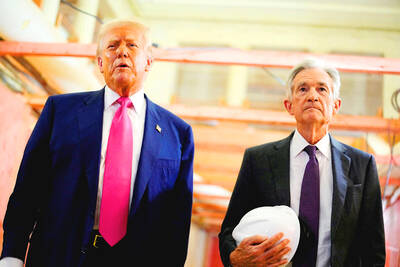Minister of Economic Affairs Yiin Chii-ming (尹啟銘) yesterday voiced the government’s desire to sign a free-trade agreement (FTA) with the EU, seeking support from European companies doing businesses here.
He told a European Chamber of Commerce Taipei (ECCT) luncheon yesterday that an FTA between Taiwan and the EU would serve investment and trade interests and create a win-win trade partnership.
“We believe that a Taiwan-EU FTA is vital to developing closer economic relations and partnership between Taiwan and the EU,” he told the ECCT gathering yesterday.
Citing recent estimates from the government-sponsored Chung-Hua Institution for Economic Research, Yiin said that inking an FTA would help boost the local economy by US$600 million — or 0.21 percent of the nation’s GDP growth — and economies in the EU by US$3.3 billion, or 0.04 percent of its GDP.
If the agreement further opened markets between the regions, economic benefits for Taiwan and the EU could reach US$1.4 billion and US$3.5 billion respectively, he said.
The institution estimated that local exports to the EU could increase by US$5 billion while the EU’s exports to Taiwan could jump by US$6 billion, Yiin said.
Another report by Copenhagen Economics, initiated by the Taipei chamber, is even more optimistic.
The Copenhagen report’s preliminary findings show that such an agreement would boost trade between the EU and Taiwan by “billions of euros” while accelerating the local economy “by 1 percent,” Yiin said.
Details of the Copenhagen report are to be released next week by the chamber, which will soon mail the report to the EU’s headquarters in Brussels for reference, said chief executive officer Guy Wittich.
The chamber has also initiated “trade enhancement measures” to strengthen economic relations between both sides, Yiin said.
Although the chamber has thrown its support behind the inking of a Taiwan-EU FTA, its members were more concerned about trade barriers here, which they expect would pose a challenge.
Given that local businesses have had full access to bidding for government contracts in Europe, Dirk Sanger, the chamber’s ex-chairman, urged the local government yesterday to “move on” and fulfill the nation’s six-year-old commitment by relaxing restrictions on government purchasing by foreign businesses.

IN THE AIR: While most companies said they were committed to North American operations, some added that production and costs would depend on the outcome of a US trade probe Leading local contract electronics makers Wistron Corp (緯創), Quanta Computer Inc (廣達), Inventec Corp (英業達) and Compal Electronics Inc (仁寶) are to maintain their North American expansion plans, despite Washington’s 20 percent tariff on Taiwanese goods. Wistron said it has long maintained a presence in the US, while distributing production across Taiwan, North America, Southeast Asia and Europe. The company is in talks with customers to align capacity with their site preferences, a company official told the Taipei Times by telephone on Friday. The company is still in talks with clients over who would bear the tariff costs, with the outcome pending further

NEGOTIATIONS: Semiconductors play an outsized role in Taiwan’s industrial and economic development and are a major driver of the Taiwan-US trade imbalance With US President Donald Trump threatening to impose tariffs on semiconductors, Taiwan is expected to face a significant challenge, as information and communications technology (ICT) products account for more than 70 percent of its exports to the US, Chung-Hua Institution for Economic Research (CIER, 中華經濟研究院) president Lien Hsien-ming (連賢明) said on Friday. Compared with other countries, semiconductors play a disproportionately large role in Taiwan’s industrial and economic development, Lien said. As the sixth-largest contributor to the US trade deficit, Taiwan recorded a US$73.9 billion trade surplus with the US last year — up from US$47.8 billion in 2023 — driven by strong

AI: Softbank’s stake increases in Nvidia and TSMC reflect Masayoshi Son’s effort to gain a foothold in key nodes of the AI value chain, from chip design to data infrastructure Softbank Group Corp is building up stakes in Nvidia Corp and Taiwan Semiconductor Manufacturing Co (TSMC, 台積電), the latest reflection of founder Masayoshi Son’s focus on the tools and hardware underpinning artificial intelligence (AI). The Japanese technology investor raised its stake in Nvidia to about US$3 billion by the end of March, up from US$1 billion in the prior quarter, regulatory filings showed. It bought about US$330 million worth of TSMC shares and US$170 million in Oracle Corp, they showed. Softbank’s signature Vision Fund has also monetized almost US$2 billion of public and private assets in the first half of this year,

POWELL SUCCESSOR: US Fed Governor Adriana Kugler’s resignation gives Donald Trump an opening on the board, potentially accelerating his decision on the next chair US President Donald Trump suddenly has a chance to fill an opening at the US Federal Reserve earlier than expected, after Fed Governor Adriana Kugler announced her resignation on Friday. It might also force him to pick the next Fed chair months sooner than he had anticipated. “The ball is now in Trump’s court,” LH Meyer/Monetary Policy Analytics Inc economist Derek Tang said. “Trump is the one who’s been putting pressure on the Fed to do this and that, and Trump says he wants to have his own people on. So now he has the opportunity.” Kugler’s exit unfolds amid unprecedented public pressure